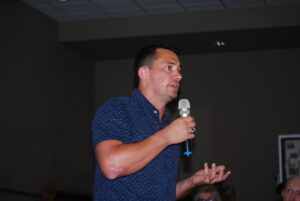Disinformation. Misinformation. Lies. Bunk. Hoaxes.
All those terms fall under the umbrella of fake news, according to a media literacy expert, who spoke Sept. 14 to the League of Women Voters in Chico.

“We generally only cherry-pick the fake news producers that we dislike,” said Nolan Higdon, the author of “The Anatomy of Fake News.” “We don’t like to admit there are some people we do like who also produce fake news.”
Hidgon, a history and media studies lecturer at the University of California, Santa Cruz, was invited by the local League to discuss media literacy and recommend tips that can be used to fight fake news. The most important thing he wanted to encourage people to do is to verify that information they’re consuming meets journalistic standards.
“Journalists have sources,” Higdon noted. “Journalists tell you who those sources are. Journalists are transparent. They’re accountable to their editors. Good journalism does not have conflicts of interest. If it lacks any of those, if it doesn’t have sources and it doesn’t balance its sources, what you may be dealing with is opinion editorial.”
In addition, he encouraged people to resist the pressure to comment, share and “like” a topic on social media. Instead, he said, really investigate any piece that confirms your bias, don’t trust headlines, and be wary of selective editing.
One audience member asked if podcasts and other types of media follow the same fact-checking rules as legacy media, and how the audience can verify the truth of what is said on podcasts.
Higdon said that unlike legacy media, many podcasts and other new media usually don’t have editors as gatekeepers or fact-checking rules, which creates a duality: On one hand, it risks straying from the truth when they constantly need to capture reader attention, but on the other hand it allows readers to see the news that corporate media suppress.
Higdon told ChicoSol that one of the things he prides himself on is being a critic of the political left, right and center. “I’m a critic across the spectrum. I try to be really as fair as possible.”
He said he felt more comfortable dropping a name like “Walter Cronkite” at the League’s morning gathering at St. John’s Episcopal Church. “I expected everybody in the room to know who it is, while in my classes with 22-year-olds, I am probably gonna’ explain who Walter Cronkite is.”
An audience member asked: “It seems to me that increasingly, when I visit a friend, I am met with outrage or an idiot-awful story from something they saw on the Internet. You no longer have a personal exchange. You have an angry, hostile presentation that has nothing to do with them. It’s exhausting. How do we move past that?”
“Does that story resonate with other people in the room?” Higdon responded, followed by laughter from the audience.
At the end of his presentation, Higdon said, “I want to encourage all of us to use those perspectives to reach out to other folks.”
“If someone believes something that’s totally insane, it’s all of our responsibilities to do our best to try and lead them toward the truth,” he said. “Not shame them into it, not make fun of them, not ostracize them, but try and reach them on some human level.”
He provided an easy technique: “Sometimes it’s just saying, like, ‘I’ve never heard that before’ or ‘Where did you read that?’”
Yucheng Tang is a California Local News Fellow reporting for ChicoSol.

Given that it’s election season, this is an important topic. Thank you Yucheng Tang and ChicoSol.